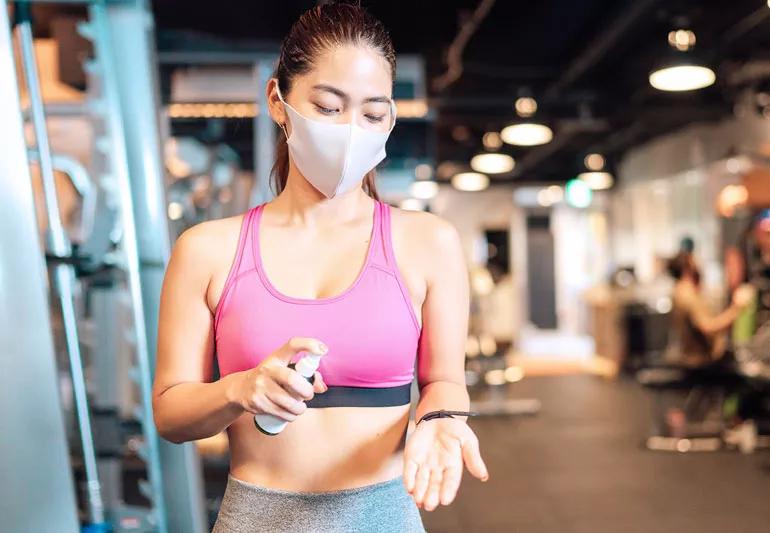Best practices for avoiding gym germs

Image content: This image is available to view online.
View image online (https://assets.clevelandclinic.org/transform/55fddfb3-eb2f-4ae0-8743-e29d7e7c52dc/gymColdFluSeason-1253279787-770x553-1_jpg)
woman using the gyn during covid and flu season
There’s many reasons why exercise and going to the gym is good for us. But now (more than ever) if we’re not following the proper guidelines to stop the spread of germs, our well-meaning habit could end up hurting our health and those around us.
Advertisement
Cleveland Clinic is a non-profit academic medical center. Advertising on our site helps support our mission. We do not endorse non-Cleveland Clinic products or services. Policy
So how do we reduce our risk of illness and keep each other safe at the gym this cold and flu season? (And also in the middle of a global pandemic!) Sports medicine specialist Caitlin Lewis, MD, gives these tips for avoiding gym germs and staying healthy.
Advertisement
Many people will soon head back indoors to gyms when the weather breaks for fall and winter, potentially making it more crowded than it may have been in the spring and summer.
“If you can, I would recommend trying to exercise outdoors for as long as possible,” says Dr. Lewis. “Or find an at-home program you enjoy and can stick with.”
If you’re feeling sick (especially this year), just stay home. Cold and flu season mixed with the COVID-19 pandemic is a threat to everyone and your daily workout isn’t worth putting other people’s health at-risk.
Missing a day or two at the gym isn’t going to undo all your hard work or cause you to lose your gains either. In fact, allowing your body to rest and recover could help you bounce back quicker than just trying to power through.
That being said, some people feel better after a good sweat sesh, especially if they’re congested or their sickness is very mild. The increased blood flow and movement can sometimes do the body good. In these instances, Dr. Lewis recommends playing it safe and choosing an at-home workout or walking or running outside in a non-crowded area. You’ll want to pay attention to how you’re feeling and modify the workout if you become fatigued or feel worse than before.
We’re still learning about COVID-19’s long-term implications, especially when it comes to the heart and athletes, says Dr. Lewis. So if you’re diagnosed with the virus, you’ll need to check with your doctor once you recover for a graduated return to exercise program. Your doctor will work with you to ensure your heart and lungs have recovered and it’s safe for you to return to the gym or training.
Still, it’s even more crucial this year to get your flu shot to help fend off illness.
Advertisement

Delivered every Tuesday!
Sign up for our Health Essentials emails for expert guidance on nutrition, fitness, sleep, skin care and more
It's a letter about the news!

Every two weeks once
Sign up for our Health Essentials emails for expert guidance on nutrition, fitness, sleep, skin care and more.
Learn more about our editorial process.
Advertisement
While it typically starts in October, vaccine effectiveness can affect its duration and severity
Get vaccinated, consider wearing a mask and stock your medicine cabinet
Influenza puts stress on your body and can lead to serious conditions like pneumonia or stroke
There are three antigenic types of influenza, but A and B are responsible for our flu season
Resting, staying hydrated and taking over-the-counter medicine can help you recover quickly
You can spread the flu to others a day before you feel sick and for several days after
The antiviral medication can help curb symptoms and shorten recovery time
These nutritious foods will help your body to better fight the flu
Type 2 diabetes isn’t inevitable with these dietary changes
Applying a hot or cold compress can help with pain
Pump up your iron intake with foods like tuna, tofu and turkey